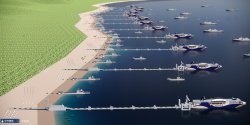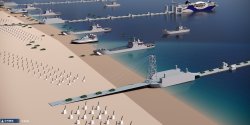Strongly disagree with your points. Your points seem to reflect this notion that reunification is like a one time thing and not a long term event.A few thoughts on the China-Taiwan situation...
I'd like to take the contrarian view that China does not have a "deadline" by which Taiwan must be "reunified".
China absolutely have a history of setting fixed timelines for matters regarding reunification. These decisions are political in nature, not whether X GDP was reached or when X# of weapons are produced. Take a look at the history of the Chinese civil war and the return of Macau to PRC China, you don't think the date of 20 December 1999 was just random right?
Mainstream media and a lot of voices here seem to unilaterally adopt the overtone that a Taiwan unification must happen sooner or later, implying that China is slowly running out of patience and will eventually kick off a pre-planned invasion (if peaceful efforts are not fruitful). China seems to be satisfied with the current status-quo and overt military trends do not point towards significant preparations for a Taiwan contingency (even with the recent construction of amphibious landing barges). MSM tends to focus on the following justifications for an "expedited" Chinese invasion:
Even if the above were enough to get the Chinese brass/leaders to panic (they are not), this argument does not take into account that Taiwan is much worse in those economic & demographic indicators than China is.
- Economic growth slowdown
- Unfavorable demographic trends
- Xi wants to add Taiwan to his resume/legacy
We need to analyze the Chinese reunification process in totality, not just when is it easier to land PLA troops on Taiwan. China has to govern the land for eternity, those costs are long term while the military action costs are one time. China understands full well the enormous costs over a long period of time needed to pacify a breakaway region with a history of separatism. Heck, just look at China XXX regions right now.
This isn't the old ROC era in Taiwan, where Mao and Deng could wait it out since both sides were Chinese and suppressed separatism. Analogous to the three kingdoms era where numerous political entities battle to see who is the better ruler of China. The post 2000 Taiwan is actively moving towards independence, akin to Vietnamese local warlords declaring independence during early Chinese dynasties.
According to you Taiwan is in worse shape demographically than China, that's why they are starting to mass import Indians (suspiciously similar to a lot of countries in the west). For those people who live in a country which have yet to be culturally enriched by Indians, let's just say the overall governance cost of a multicultural society increases more than you think.
As China's economic and military progress eclipses that of Taiwan and creeps up against that of the US, it is absolutely in China's favor to minimize the need for an armed conflict that could throw its long-term economic and developmental goals in jeopardy.
The younger generation in Taiwan are getting more and more brainwashed, they aren't taught basic Chinese history and have a very flawed understanding of their identity. The shifts in political spectrum is very pronouced and well documented in Taiwan. The results of having a generation of "we wuz dutch settlers" is evident from the chaos in HK in the previous 10 years, its effects can also be seen in the economy of today's Hong Kong.
Having a less brainwashed population is crucial to long-term economic and developmental goals in Taiwan. I don't want to assign blame, but let's just say there is a big reason why the Guangdong–Hong Kong–Macao Greater Bay Area project isn't progressing as fast as the central government wants to.
My third and final take draws on the premise that China understands that time is on its side and wishes to maximize the duration of relative peace in the Taiwan region
Delaying reunification might decrease the one time cost of the liberation of the island, but it also decreases the value of the island while simultaneously increases the future governance costs.
Last edited:




